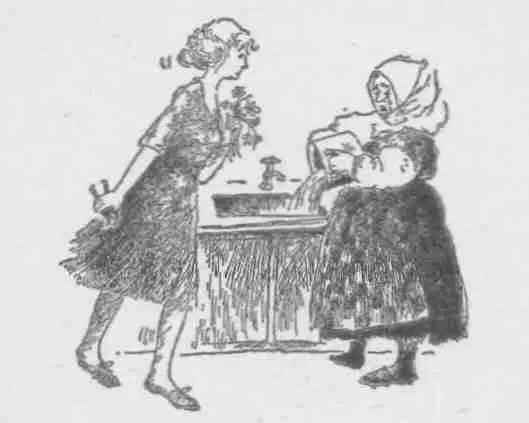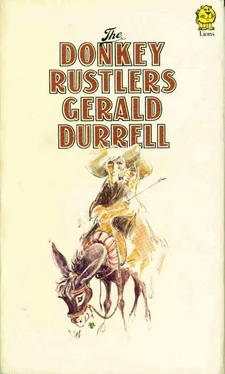“I was going to say,” he said desperately, “if only you would let me finish, that in spite of being a poor man, I am willing to offer a modest reward of, say, five hundred drachma.”
The villagers laughed derisively.
“That’s not going to get our donkeys back,” they chorused.
“No,” agreed the Inspector. No, that’s far too little. It’ll have to be much more than that.”
“Well, say one thousand drachma,” suggested the Mayor with an effort.
“Fool,” said Papa Nikos scornfully. “Do you think that if you had stolen donkeys worth 25,000 drachma you would come and give information as to their whereabouts for a paltry thousand drachma?”
“Yes,” said the Inspector, “I am inclined to agree. It will have to be much more substantial than that.”
“Five thousand drachma,” said the Mayor, the sweat running in rivulets down his fat face and into his walrus moustache.
“Make it twenty,” suggested somebody from the crowd.
“Yes, that’s much more like it,” agreed the Inspector. “That’s a fairly nice, substantial sum.”
“Very well, then,” said the Mayor, taking out his handkerchief and mopping his brow, “Twenty thousand drachma.”
A hum of approval ran through the crowd.
“Tell me,” Papa Nikos asked the Inspector. “When this Communist comes to you with the information, what do you intend to do to him?”
“Why, give him the money, of course,” said the Inspector.
“But aren’t you going to arrest him?” asked Papa Nikos surprisedly. “After all, he is a Communist.”
“It is a well-known fact,” said the Inspector wisely, “that when a Communist has money, he ceases to be a Communist. So there will therefore be no reason to arrest him.”
The villagers were much struck by this powerful piece of logic.
“Tell me,” asked Papa Yorgo, “how are we going to let them know about the reward?”
They thought about it for some minutes.
“Posters,” said Mayor Oizus suddenly, smitten with the first original idea he’d had since gaining office. “We will put up posters.”
“But where will we put them up?” asked Papa Yorgo.
“We should really scatter them like they did during the war,” said Papa Nikos.
“An aeroplane would be the answer,” mused the Inspector. “or a helicopter, but it would take too long to get one sent from Athens. No, I suggest that we put them in all the places where the Communists are likely to see them.”
“But, where’s that?” asked Papa Nikos. “Normally we hang up posters in the village.”
“Out in the olive groves,” explained the Inspector, waving his hands, “down in the vineyards and in the fields where they’re lurking.”
“How are we going to get these posters?” asked the Mayor.
It was the Inspector’s big moment. He drew himself up majestically.
“I,” he said, “have a cousin in Melissa who owns a printing press and he will print them for you . . . free.”
The burst of applause and cries of “Bravo!” from the crowd were almost deafening and the Inspector sat there smiling smugly, secure in the knowledge that he had once again won the approval of the villagers.
“What do we say on these posters?” inquired Papa Nikos. “We can’t address it to anybody, because we don’t know who they are.”
“I have given that some thought,” said the Inspector proudly and he produced another piece of paper from his pocket.
“This,” he continued, writing busily, “is what I suggest we put. “To whom it may concern — particularly Communists. We, the people of Kalanero, in return for receiving information as to the whereabouts of our donkeys, are willing to pay the sum of twenty thousand drachma.”
“Signed,” he continued, “Mayor Oizus.” Now I’ll take this in to Melissa and get it printed. They should be ready by to-morrow.”
He drove off in the police car to the cheers of villagers and they dispersed to their various houses, chattering animatedly. Only the Mayor had a despondent look. The children were breathless with excitement.
“Isn’t it wonderful! ” said Amanda. her eyes shining. “We’ve saved you, Yani! We’ve saved you!”
“Don’t speak too soon,” said David.
“Oh, you are such a pessimist,” said Amanda. “Of course we’ve saved him. All he’s got to do is to tell them where the donkeys are and he can claim the reward.”
“Do you think for one minute that they wouldn’t think that he’d pinched the donkeys if he went to claim the reward?”
“That’s true, Amanda.” said Yani, “for all the village knows that Mayor Oizus is threatening me.”
“I don’t think it matters,” said Amanda. “We can claim the reward and then give it to Yani. I think the villagers’ll be so glad to get their donkeys back that they won’t care who took them.”
“Well, don’t let’s get too excited about it,” said David. “I wouldn’t trust that Mayor for all the tea in China. He might try and back out of it.”
“I don’t think he would be able to do that,” said Yani. “I think he’s too frightened of what the villagers would do to him if he did that.”
“Well, we’ll wait and see,” said David.
The following morning the police car once more returned from Melissa and from the back of it, with great pride, the Inspector produced a huge pile of posters tastefully printed in scarlet on a white ground, and with the sum of twenty thousand drachma written extra large (both in words and figures) in case, as he pointed out, it should be a Communist who could not read.
The posters were an immediate success. Apart from anything else, they were so pretty to look at. The Inspector’s cousin was not a very expert printer and so the lines of writing went up and down like the waves of the sea, but everybody agreed that this enhanced rather than detracted from the charm of the posters and, in fact, as Mama Agathi pointed out, they were so beautiful it was really a shame to hang them up in places where only Communists could see them. The villagers all agreed, so they set one aside which they pinned up carefully on the café door. Then the posters were distributed with much arguing and shouting, for they were so beautiful that even those people of Kalanero who had no donkeys and therefore had had no donkeys stolen, wanted to have a poster.
The children watched with glee as the villagers spent the morning carefully and proudly tacking up their posters on olive trees, vine supports and to the little bamboo fences that divided all their fields. Mama Agathi was so entranced by her two posters that she even went to Mrs Finchberry-White and borrowed a feather duster so that she could go out periodically and dust them, to make sure not a speck of dust marred their pristine brilliance. Amanda and David were almost hysterical with laughter by the time they got back to the villa for lunch.
“Oh, there you are, dears,” said Mrs Finchberry-White. “I was just coming to look for you. Lunch will be a little late. We had a slight accident over the soup. I asked Agathi to serve it and for some obscure reason she poured it down the sink. She was very upset, poor thing.”
The children made their way out on to the terrace where the General was standing squinting malevolently through his monocle at his latest masterpiece.
“Mother says lunch will be a little late,” reported Amanda. “She says that for some obscure reason Mama Agathi poured the soup down the sink.”
“The reason,” said the General, “is not obscure at all. It’s just simply that your mother, with her gift for tongues, told her to throw it away instead of to bring it out here. with the not unnatural result that she poured it down the sink.”

“Oh,” said Amanda, giggling, “I didn’t realise it was that.”
Читать дальше











